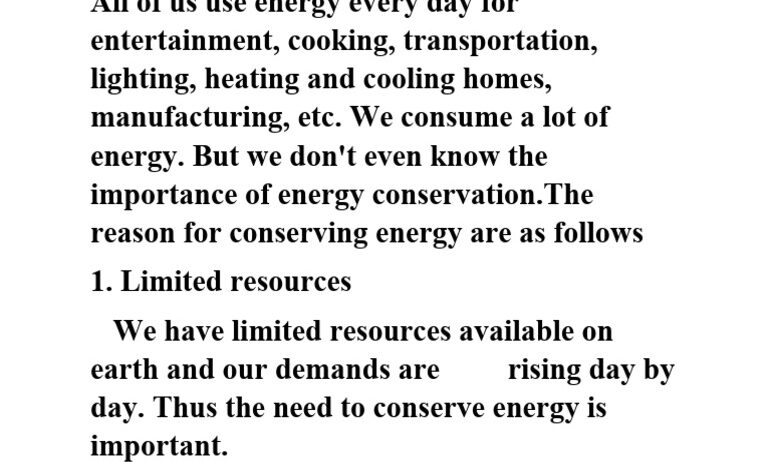When contemplating the future of energy consumption, one might ask: do we really need to conserve solar energy? Well, before answering this question, it’s essential to appreciate the sheer potential of solar energy as a sustainable resource. The inexhaustible sun provides the Earth with an abundance of energy; in one hour, our planet receives more energy from the sun than the entire global population consumes in a year. This raises a pivotal challenge—how can we ensure that we harness and conserve this bountiful resource efficiently and equitably?
To address the necessity of conserving solar energy, we must first explore the environmental context. Our planet is in a state of ecological distress, characterized by climate change, pollution, and energy scarcity. The ramifications of these issues are profound. They manifest in rising sea levels, extreme weather patterns, and biodiversity loss, which directly threaten the delicate balance of ecosystems. The reliance on fossil fuels exacerbates these crises. Transitioning to renewable sources like solar energy could mitigate some of these negative impacts.
Now, why is conservation so vital? The archetypal misconception is that solar energy, being freely available, can be consumed without restraint. However, the infrastructure required to harness this energy, from photovoltaic cells to solar panels, necessitates significant resources for production, installation, and eventual decommissioning. Every component carries a carbon footprint, thereby imploring us to reconsider how we utilize this energy. The objective should not merely be consumption but rather the judicious management of solar resources to extend their viability and minimize environmental impact.
Furthermore, we must recognize that conservation is not solely about preserving the earth’s resources for future generations, though that is certainly a primary concern. It is also about socio-economic equity. Energy consumption is often disproportionately skewed towards affluent populations; thus, conservation efforts contribute to creating a fairer distribution of energy across various socio-economic groups. By optimizing solar energy utilization, we can realize a more homogenous accessibility to energy resources, promoting inclusivity and ensuring resilient energy independence.
Additionally, the technology surrounding solar energy has evolved significantly, yet it still faces limitations. Solar panels are affected by shading, orientation, and climatic conditions. These variables can hinder the performance of solar energy systems. Thus, conservation also embodies smart technological application. By employing energy storage systems and smart grids, we can maximize the efficiency of solar energy integration into our everyday lives. The aim is to make solar energy not just a supplementary resource but a predominant one that challenges the rigidity of traditional energy systems.
Moreover, there lies a pressing need for advocacy and education. The general public must be informed about the potential benefits and the necessity of conserving solar energy. Awareness fosters a culture of responsibility where individuals acknowledge their energy consumption habits and make concerted efforts towards conservation. Whether through simple actions like utilizing efficient appliances, participating in community solar programs, or encouraging local governments to invest in renewable infrastructure, grassroots movements can enact monumental change in energy consumption patterns.
Another facet to consider is the economic implications of solar energy conservation. As the demand for renewable energy surges, so does the job market in related sectors. From manufacturing to installation and maintenance of solar panels, a plethora of employment opportunities are being created. By investing in solar technology and conservation efforts, we bolster local economies and stimulate innovation. This aligns with a broader economic strategy that promotes sustainability, resilience, and growth.
As we navigate the landscape of energy conservation, it becomes paramount to challenge preconceived notions about solar energy consumption. The playful question lingers: are we simply passive consumers of solar energy, or are we proactive stewards of our environmental future? To remain stationary in our approach would be complacent and detrimental. Effective conservation strategies must be implemented at multiple levels—individual, community, and global.
Implementing policies that incentivize solar energy usage and conservation can also enhance efficiency. Governments and organizations should advocate for comprehensive regulations that encourage innovation and accountability. For instance, promoting research in solar energy technologies can yield breakthroughs that further lower cost barriers and ensure sustainable practices. These actions crystallize a societal commitment to relentlessly pursue an energy future that is robust, clean, and equitable.
In summation, the question of whether we need to conserve solar energy is not merely rhetorical; it represents a fundamental challenge in our quest for a sustainable future. The fusion of solar energy’s promise with deliberate conservation efforts can yield transformative results, not just for the environment but for society at large. By embracing this responsibility, we can unlock the full potential of solar energy, ensuring that our efforts contribute not only to ecological integrity but also to economic viability and social justice.
Ultimately, the quest for solar energy conservation is an invitation to innovate and rethink our relationship with energy. It urges us to break free from the confines of traditional consumption models and embrace a new paradigm, one that recognizes the intrinsic worth of ecological sustainability. Therefore, the question remains not just about acceptance of solar energy, but how diligently and responsibly we choose to conserve it.







